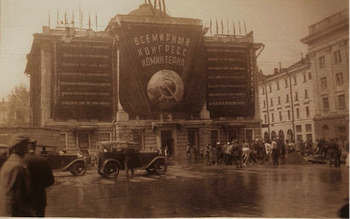This section covers the period from 1917 to 1941 in international relations. We will be looking at the Russian Revolution as an international movement. Why did the Bolsheviks depend so much on exporting revolution to the West? How realistic were their hopes? Why did so many Western intellectuals believe in Soviet propaganda? How did Stalin's policies towards the Fascist powers change? Why did the Soviets sign the treaty of non-aggression with the Nazis in 1939. The section contains extracts from my books, photographs and a video, and a reading list. Register here to get information on accessing more materials including my responses to exam questions on these themes.

Comintern Congress, Moscow 1935
Germany was the focus of the revolutionary hopes. It had the strongest socialist traditions in Europe. And it was next door. Read more...
The Bolsheviks were keen to coordinate the activities of the new Communist parties and to keep them well apart from the Social Democrats of the Second Socialist International (1889-1916) by organizing them through the Comintern - the Communist or Third International. Read more...
Revolutionary expansion no longer an immediate option, the Bolsheviks divided the long-term preparation of world revolution by the Comintern from the practical diplomacy conducted by the Commissariat of Foreign Affairs. Read more...
It is debatable whether a united front of German Communists and socialists could have prevented Hitler from coming to power. Read more...
The French Left was the key to the formation of a United Front. Read more...
On 23 August 1939 the Soviets signed a Pact of Non-Aggression with Hitler's Germany. Read more...
These images tell us about Soviet aims and fears abroad between 1917 and 1941. Read more...
Here are some exam-like questions. Read more...
A recording of a lecture/class using primary documents. Read more...
A list of further reading. Read more...

